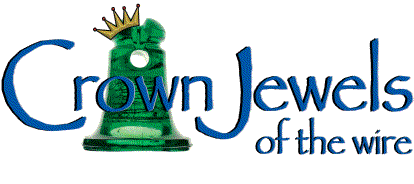Me And The 143 (#12)
by Grant Salzman, NIA #1785
Reprinted from "INSULATORS - Crown Jewels of the Wire", June 1981, page 11
Great North Western
Telegraph Co.!! What a romantic name! Can you imagine the visions that this name
would conjure up in the minds of the city dwellers and Easterners during the
middle and late 1800's?? Wouldn't it foster pride and stir up the pioneer
spirit? Unfortunately the name is no longer used, but it still exists on the
skirts of insulators which were used by that company.

(Drawing is by Clay Salzman)
The Great North Western
(note the "North" and "Western" are usually separated) was a
very early threaded insulator, produced in what I call Mold Style #6. The wire
groove is small and shallow and is about 1-3/4" from the base. It was
produced in a two-piece mold (MLOD) and comes in three sub-styles.
The most
common sub-style was used for the earliest production of the Great North Western
and then later for the last types produced the G.N.W.'s. It has a rounded base
that slopes in somewhat, although in a couple of examples the slope is quite
sharp.
|
1.
|
F -- GREAT NORTH WESTERN
|
|
|
B -- TELEGRAPH CO (Lettering is 3/8" tall.)
|
|
|
Aqua.
|
|
2.
|
F -- GREAT NORTH WESTERN (Last bar of "N" is crooked.)
|
|
|
B -- TELEGRAPH CO ("C" in "CO" is high.) (Lettering is
3/8".)
|
|
|
Aqua.
|
|
3.
|
F -- GREAT NORTH WESTERN
|
|
B -- TELEGRAPH . CO (Note the Period.)
|
|
(Lettering is 7/16" tall and "North" & "Western"
are close.)
|
|
Aqua, Green.
|
|
Note that the book lists this variety in blue, but I
have never seen one.
|
The second sub-style (Mold style #6B) is exactly the same
as #6A except that the base is grooved!
1.
|
F -- GREAT NORTH WESTERN
|
|
B -- TELEGRAPH
CO
|
|
Aqua.
|
After the merger of Dominion, Montreal and Great North Western,
the company removed its name from their insulator and used only
"G.N.W". Initially, an old mold was used and the full name was routed
out of the mold, resulting in a raised "slug plate" which circles the
skirt. Then "G.N.W" was embossed in large letters above the slug
plate. The variety with the raised slug plate is Mold Style #6C.
1.
|
F -- G.N.W
|
|
Aqua, Lt. Green.
|
Subsequently production was all back to mold style #6A,
although the height and length of the embossing on various molds differed
considerably.
1.
|
F -- G N W (No periods and the spacing is uneven.)
|
|
Letters are
5/16" tall and embossing is 1 1/2" long.
|
|
Lt. Green, Lt.-Smoky Green,
Smoky SCA, SCA.
|
2.
|
F -- G.N.W
|
|
Letters 7/32" tall, embossing 1 1/8" long.
|
|
Green, Lt. Green, Lt. Yellow-green.
|
3.
|
F -- G.N.W
|
|
Letters 1/4" tall,
embossing 1 3/4" long.
|
|
Aqua, Green, Dark Green, Lt. Yellow-green
|
4.
|
F -- G.N.W
|
|
Letters 1/4" tall, embossing 2" long.
|
|
Aqua, Green, Lt.
Yellow-green.
|
5.
|
F -- G.N.W
|
|
Letters are 9/32" tall, embossing 1 3/4"
long.
|
|
Aqua, Green.
|
6.
|
F -- G.N.W
|
|
Letters are 9/32" tall, embossing 2"
long.
|
|
Aqua, Lt. Aqua, Blue.
|
7.
|
F -- G.N.W
|
|
Letters 5/16" tall, embossing
112" long.
|
|
Aqua.
|
Prices: The Great North Western is priced a little too
high, but that's what you pay for a slice of history, and I think that anyone
with an ounce of romance in their heart should have one in their collection. The
green variety is very scarce. The grooved base variety is extremely rare, and
the raised slug plate variety is a little under-priced in the book. The catalog
also prices the aqua G.N.W's a little too low, and the greens a little too high.
They both should be about the same.
The smoky SCA and the SCA G.N.W's are not
listed in the book and are very scarce and desirable. Of the few that exist,
most are smoky with just a tinge of amethyst. I have seen only one that is a
heavy SCA.
|
